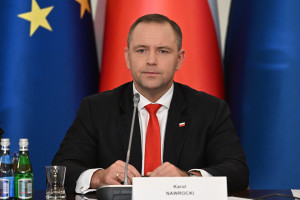Uproar over Warsaw authorities' decision. "A mockery of residents, police, city guards, and doctors."

- Anna Biskot criticizes the decision of Warsaw councilors to limit the night-time prohibition to only two districts
- The psychotherapist points to the strong influence of the alcohol lobby and the lack of real action
- Examples from Lithuania and Scandinavia show that restrictions on night-time sales reduce the number of deaths and disturbances.
Anna Biskot , an addiction psychotherapist, stated that opponents of nighttime prohibition are effectively defending "the devil's invention," contributing to the tragedy of thousands of people. This is her response to the cancellation of the nighttime alcohol sales ban across the capital.
"Nothing takes away freedom like alcohol and drugs. That's the first thing. And secondly, to those who shout about freedom and the right to shop at night, I would recommend five mandatory shifts at the detox center and five at the sobering-up station on Kolska Street. Not for viewing, but for work. So they can see what it means when a customer goes to the gas station in the middle of the night, buys vodka, and ends up on a weekly binge," Biskot emphasized in an interview with PAP.
The psychotherapist said her patients regularly talk about how the availability of alcohol at night pushes them back into addiction.
" I wasn't supposed to drink anymore, but I got hungry. It was midnight, I went out, bought some, started drinking, and drank for a week —these are quotes I hear time and time again," she said.
"Opposition to restrictions on alcohol sales is irrational"According to Biskot, opposing restrictions on alcohol sales is irrational. "It's like defending poison. A substance that slowly but surely kills people. And yet it's done by educated people, councilors, and people with positions of power. And they don't see that limiting sales at night would be enough to make it quieter, safer, and less disruptive," she said, outraged.
At Thursday's session, Warsaw city councilors rejected the introduction of a citywide nighttime alcohol sales ban. They only approved a pilot nighttime prohibition in two districts: Śródmieście and Praga-Północ. This decision prompted Vice Mayor Jacek Wiśnicki (Polska2050) to resign, calling it a "façade document" and a capitulation to lobbyists.
- This is a mockery of the residents, the police, the city guard, the doctors - said Agata Diduszko-Zyglewska , chairwoman of the Left and City Is Our club.
Anna Biskot believes that the decisions of the capital's authorities demonstrate the powerful influence of the alcohol industry. "So many years of work, reports, campaigns. And what's left of it? Nothing. The alcohol lobby is so powerful that one can only be ashamed when looking at Denmark or Lithuania. There, in five minutes, they removed advertising, raised the drinking age to 21, restricted sales to 10 p.m., and the number of deaths dropped . Here? We're debating whether even two districts can handle it," she said.
She gave examples: "In Lithuania, drinking was killing people en masse. They introduced a ban on night-time sales, and the alcohol mortality rate started to straighten out. It's as simple as pie. And we in Warsaw still wonder if anyone might feel wronged for not buying beer at 2 a.m.," she noted.
Opponents of nighttime prohibition often point to the illegal alcohol trade. Biskot believes this is a myth.
"There have been, are, and will always be speakeasies, but that only applies to the poorest, those who drink moonshine and liquor. This isn't an argument against the ban. Many people will simply give up if they can't go to the store around the corner. They won't want to drive to the other end of town. And that will save at least a few," she emphasized.
Biskot spoke openly about the community's sense of helplessness. "Therapists are furious. We're so angry that we think we're going to start a revolution in this country. Because it's unacceptable that, knowing how alcohol destroys people, educated councilors are helping to sell it. This is not only irrational, it's simply cruel," she said.
She concluded by adding, " Alcohol is not a basic necessity. It's not bread, it's not milk, it's not medicine. It's the devil's invention, killing people slowly but surely. Defending its sale at night is unimaginable to me."
In turn, Andrzej Silczuk , a psychiatrist specializing in addictions, told PAP that "The decision of the Warsaw City Council will certainly affect the image of the city among European capitals and the health of its residents."
Currently, approximately 180 municipalities in Poland have introduced nighttime smoking bans . In Kraków, Bydgoszcz, and Biała Podlaska, it covers the entire city. In Poznań, Wrocław, Katowice, and Kielce, it covers only the city centers. Since September, the nighttime smoking ban has been in effect in Gdańsk, and during the tourist season, in Giżycko and Słupsk.
In Lithuania and Scandinavia, stringent regulations have resulted in a decrease in the number of deaths and disturbances. Meanwhile, in Warsaw, experts note, compromises and further pilot trials are being implemented.
Andrzej Górniak , an addiction psychotherapist, concluded: "The decision by Warsaw councilors to impose a nighttime prohibition in just two districts is an illusion. An addict will still find alcohol and walk several kilometers to satisfy their cravings. If the ban applies to the entire city, it could have a real effect, as in Krakow, where the number of disturbances and interventions has decreased."
Copyrighted material - reprint rules are specified in the regulations .
rynekzdrowia










